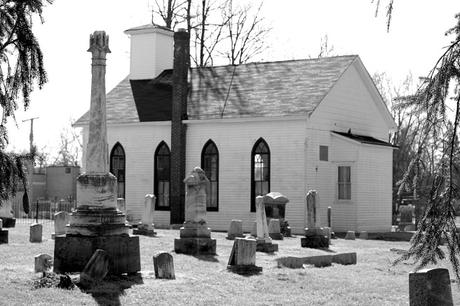
Across the street from our house stands an old Catholic church, its magestic steeple reaching far into the sky. From eight o'clock in the morning until ten o'clock at night, the church rings out the hours on bells that echo across Charlestown. During this time of year, along with the bells are old Christmas Carols - "In the Bleak Midwinter," "O Come O Come Emmanuel," and "Hark the Herald Angels Sing" are all treats for the ears during this season. The carols start at the beginning of Advent and go through Epiphany on January 7th.
It is also a church that holds a lot of funerals. Almost weekly, parking signs will appear warning us not to park across the street by the church. The unspoken message is for us to give honor to those attending the funeral by giving up our hard fought parking spaces, for it is a city, and fights landing people in jail have happened over parking spaces. Most of us willingly give up our spots, our contribution to what is already a grief-filled time for those who attend.
In recent months the most common scene at the church has been masked mourners, the most common funeral sound bagpipes, their melancholic sounds echoing through the neighborhood. It has brought me to tears more than once. Could there be an instrument more mournful? I don't think so.
Whenever I hear the bagpipes I know that a hearse is not far behind.
Though I feel sad, I also feel hope with these funerals. People are gathering. They are mourning together. As a family that has gone through profound grief alone, postponing a memorial service for months following a death, I delight in seeing these masked mourners gather. They are bearing witness to grief and in doing so showing the strength of community.
As I think of the regular occurrence of funerals across the street, and the millions of other deaths and subsequent funerals from this past year, I think of the words of Psalm 139, a Psalm that I have been reading and rereading during these first couple of days of the New Year.
More than any other Psalm or words in scripture, this one gets to the heart of a God who knows and loves us. The words "all the days ordained for me were written in your book before one of them came to be" are a powerful reminder that God knows the number of our days. He knows when the masked mourners and bagpipes or their equivalent will be played for each person.
But the Psalm is so much more than just knowing our days. The messages are profoundly comforting: We are seen clearly. We are known fully. We are loved extravagantly. The disconnect comes as I contemplate the truth of those three things with the way I live my life. If I really believe that I am seen clearly, known fully, and loved extravagantly, would I not rest easier? Would I not be more secure? It's something I've struggled with for possibly my entire life.
The Psalmist, because he is human, seems to understand the disconnect. Indeed, he admits his own inability to understand saying that it is too much and too wonderful to understand.
Our world offers a lot of substitutes for the truths in Psalm 139, and many of them feel quite real, but the past year has shown that they are fleeting at best. Our security in health, jobs, travel, friendships, and safety is an illusion. While the "enemy" used to be something that the West thought they could keep out with high fences and strong borders, an invisible virus has broken through all of those illusions, making us servants to fear and grasping and gasping for hope.
What better time then, to lean in hard to these truths of being seen, known, and loved, for the more I lean in, the more aware I am of false substitutes and the more I find rest in God's safety net.
All things find refreshing calm and peace when they have found their center.
Based on writings from St. Nicodemus of the Holy Mountain written in verse by Scott Cairns in Endless Life

